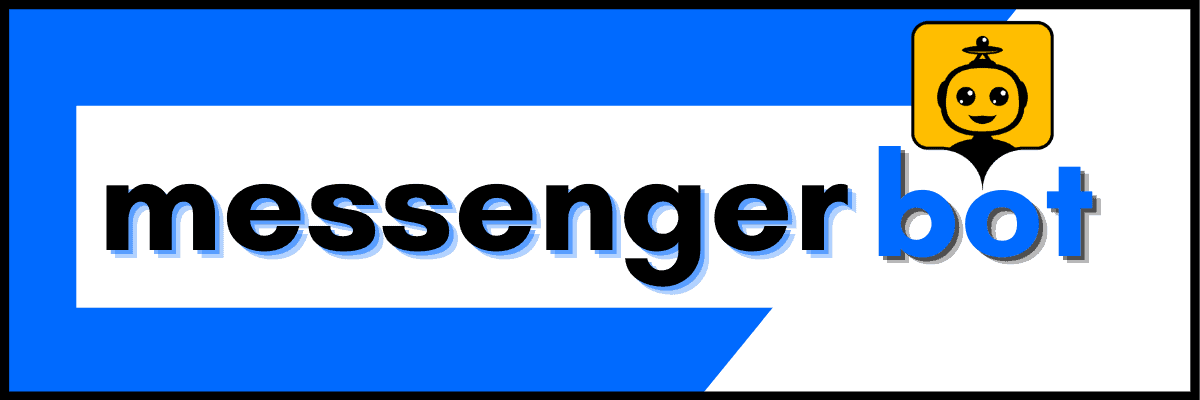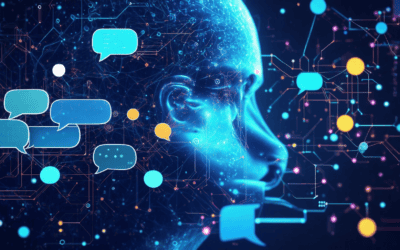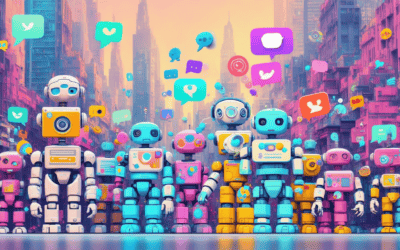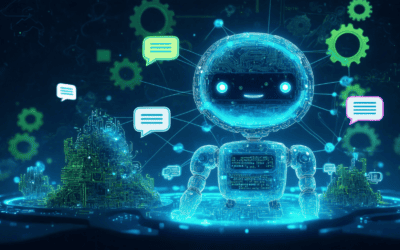In today’s rapidly evolving digital landscape, the benefits of AI chatbots are becoming increasingly evident, particularly in the healthcare sector. This article, titled Unlocking the Benefits of AI Chatbots: How They Transform Healthcare and Enhance User Experience, delves into the transformative power of chatbot technology in healthcare and its ability to enhance user experience. We will explore the advantages and disadvantages of chatbot technology, shedding light on both the positives of AI chatbots and the challenges they present. Additionally, we will examine the benefits of chatbots in healthcare, focusing on their role in patient engagement, appointment scheduling, and improving service delivery. By addressing common questions such as what are the benefits of using AI chatbots and what problems do AI chatbots solve, this article aims to provide a comprehensive overview of how AI healthcare chatbots are revolutionizing the industry. Join us as we uncover the myriad benefits of AI chatbots and their potential to reshape the future of healthcare.
What are the pros and cons of AI chat?
Advantages and disadvantages of chatbot technology
AI chatbots have become increasingly prevalent in various industries, particularly in healthcare, where they enhance user experience and streamline communication. Understanding the benefits of AI chatbots is crucial for organizations looking to improve their service delivery. Here are some key advantages and disadvantages of chatbot technology:
Pros:
- 24/7 Availability: AI chatbots provide round-the-clock service, ensuring that customer inquiries are addressed at any time, which enhances user satisfaction and engagement.
- Cost Savings: Implementing AI chatbots can significantly reduce operational costs by minimizing the need for human customer service representatives, allowing businesses to allocate resources more efficiently.
- Personalized Customer Experiences: Advanced AI algorithms can analyze user data to deliver tailored responses and recommendations, improving the overall customer experience and fostering brand loyalty.
- Scalability: AI chatbots can handle a large volume of inquiries simultaneously, making them ideal for businesses experiencing rapid growth or seasonal spikes in customer interactions.
- Data Collection and Analysis: Chatbots can gather valuable insights from customer interactions, helping businesses understand customer preferences and improve their services.
Cons:
- Limited Understanding of Complex Requests: AI chatbots often struggle with nuanced or complex queries, which can lead to frustration for users who require detailed assistance.
- Potential for Data Breaches: The use of AI chatbots raises concerns about data security, as sensitive customer information may be vulnerable to cyberattacks if not properly safeguarded.
- High Implementation Costs: While chatbots can save money in the long run, the initial investment in technology and ongoing maintenance can be substantial, particularly for small businesses.
- Lack of Human Touch: Many customers prefer interacting with human representatives, especially for sensitive issues, and may find AI interactions impersonal or unsatisfactory.
- Dependence on Technology: Over-reliance on AI chatbots can lead to a decline in human customer service skills within organizations, potentially affecting overall service quality.
Disadvantages of AI chatbots in various industries
While the benefits of chatbots are significant, it is essential to consider their limitations across different sectors. In industries like healthcare, where sensitive information is exchanged, the disadvantages can have serious implications:
- Complexity of Healthcare Queries: Patients often have intricate questions regarding their health, which AI chatbots may not fully comprehend, leading to inadequate responses.
- Data Privacy Concerns: The handling of personal health information by AI chatbots raises ethical questions and necessitates stringent security measures to protect patient data.
- Integration Challenges: Implementing AI chatbots within existing healthcare systems can be complex, requiring significant time and resources to ensure seamless operation.
- Resistance from Staff: Healthcare professionals may be hesitant to adopt AI technology, fearing it could undermine their roles or lead to job displacement.
In conclusion, while AI chatbots offer numerous benefits in healthcare and other industries, it is crucial to weigh these against their potential drawbacks to make informed decisions about their implementation.

What are the pros and cons of AI chat?
AI chatbots have revolutionized the way businesses interact with customers, particularly in the healthcare sector. Understanding the benefits of AI chatbots is crucial for organizations looking to enhance their service delivery. However, it is equally important to consider the disadvantages of chatbot technology to make informed decisions.
Advantages and disadvantages of chatbot technology
The benefits of chatbots are numerous, particularly in improving customer service. Here are some key advantages:
- Improved Customer Service: Chatbots provide instant responses to customer inquiries, enhancing user experience and satisfaction. According to a study by IBM, businesses can save up to 30% on customer service costs by implementing chatbots.
- 24/7 Availability: Unlike human agents, chatbots can operate around the clock, ensuring that customers receive assistance at any time. This constant availability can lead to increased customer engagement and retention.
- Scalability: Chatbots can handle multiple inquiries simultaneously, allowing businesses to scale their customer service operations without a proportional increase in staffing costs. This scalability is particularly beneficial during peak times or promotional events.
- Data Collection and Insights: Chatbots can gather valuable data from customer interactions, providing businesses with insights into customer preferences and behavior. This information can be used to tailor marketing strategies and improve product offerings.
- Cost Efficiency: By automating routine tasks, chatbots can significantly reduce operational costs. A report from Juniper Research estimates that chatbots will help businesses save over $8 billion annually by 2022.
- Personalization: Advanced chatbots utilize AI and machine learning to provide personalized responses based on user data and previous interactions, enhancing the overall customer experience.
- Lead Generation: Chatbots can engage potential customers through interactive conversations, qualifying leads and guiding them through the sales funnel, which can increase conversion rates.
- Multilingual Support: Many chatbots are equipped to communicate in multiple languages, allowing businesses to serve a global audience and cater to diverse customer bases.
- Integration with Other Systems: Chatbots can be integrated with CRM systems, social media platforms, and other tools, streamlining operations and improving the efficiency of customer interactions.
- Continuous Learning: With the implementation of machine learning algorithms, chatbots can continuously improve their responses and capabilities based on user interactions, leading to better service over time.
Despite these advantages, there are also some disadvantages of AI chatbots that should be considered:
- Limited Understanding: Chatbots may struggle with complex queries or nuanced conversations, leading to customer frustration.
- Dependence on Technology: Over-reliance on chatbots can result in a lack of human touch, which is essential in certain customer service scenarios.
- Privacy Concerns: Handling sensitive information through chatbots can raise privacy issues, particularly in industries like healthcare.
What are the potential benefits of chatbot?
The benefits of AI chatbots extend beyond customer service, particularly in sectors like education and healthcare. Understanding these benefits can help organizations leverage chatbot technology effectively.
Benefits of AI chatbots in education and healthcare
In the healthcare industry, AI chatbots play a pivotal role in enhancing patient engagement and streamlining operations. Here are some notable benefits:
- AI Chatbot Benefits for Patient Engagement: Chatbots can provide patients with timely information about their health, medication reminders, and appointment scheduling, which improves overall patient engagement.
- Use of Chatbots in Healthcare for Appointment Scheduling: Chatbots can automate the appointment scheduling process, reducing administrative burdens on healthcare staff and allowing patients to book appointments at their convenience.
By integrating chatbot technology in healthcare, organizations can significantly enhance service delivery and patient satisfaction.
How Does AI Chatbot Help?
AI chatbots are advanced conversational agents designed to interact with users through natural language processing (NLP) and machine learning algorithms. They play a significant role in enhancing customer experience (CX) across various industries. Here’s how AI chatbots help:
AI Chatbot Benefits for Patient Engagement
One of the primary benefits of AI chatbots in healthcare is their ability to enhance patient engagement. By providing immediate responses to patient inquiries, chatbots can significantly improve the overall patient experience. For instance, AI chatbots can assist patients in understanding their symptoms, offering preliminary advice, and guiding them through the healthcare process. This proactive engagement not only helps in addressing patient concerns but also fosters a sense of connection between patients and healthcare providers.
Moreover, AI chatbots can facilitate ongoing communication with patients, reminding them of appointments, medication schedules, and follow-up care. This consistent interaction is crucial for maintaining patient adherence to treatment plans, ultimately leading to better health outcomes. The benefits of chatbots in healthcare extend beyond just engagement; they also empower patients to take charge of their health, making informed decisions based on the information provided by these intelligent systems.
Use of Chatbots in Healthcare for Appointment Scheduling
Another significant benefit of chatbots in the healthcare sector is their role in appointment scheduling. AI chatbots can streamline the booking process by allowing patients to schedule, reschedule, or cancel appointments through simple conversational interfaces. This automation reduces the administrative burden on healthcare staff and minimizes the chances of scheduling errors.
Furthermore, chatbots can provide patients with real-time availability of healthcare providers, ensuring that they receive timely care. By integrating with existing healthcare systems, AI chatbots can access up-to-date schedules and offer personalized recommendations based on patient preferences. This not only enhances operational efficiency but also improves patient satisfaction by making the appointment process seamless and user-friendly. The use of chatbots in healthcare for appointment scheduling exemplifies how technology can transform traditional practices into more efficient, patient-centered experiences.
What are the positives of AI chatbot?
AI chatbots have emerged as transformative tools in various sectors, particularly in enhancing user experience. The benefits of chatbot technology are numerous, making them invaluable for businesses aiming to improve customer interactions and streamline operations. Here are some key advantages:
Benefits of Chat Bot Technology in Enhancing User Experience
One of the primary benefits of AI chatbots is their ability to provide instant responses to user inquiries. This immediacy not only enhances customer satisfaction but also reduces the workload on human agents. By automating routine queries, chatbots allow businesses to focus on more complex issues that require human intervention. Furthermore, the use of chatbots in healthcare has shown significant improvements in patient engagement, as they can provide timely information and support.
Additionally, AI chatbots can be programmed to learn from interactions, continuously improving their responses and recommendations. This adaptability ensures that users receive personalized experiences tailored to their preferences, which is a crucial aspect of modern customer service. The benefits of chatbots extend beyond mere efficiency; they also foster a deeper connection between businesses and their customers.
Chatbots and Healthcare: Improving Service Delivery
In the healthcare sector, the benefits of AI chatbots are particularly pronounced. AI healthcare chatbots can assist with appointment scheduling, medication reminders, and even preliminary symptom assessments. This not only enhances patient engagement but also optimizes the workflow within healthcare facilities. By reducing wait times and improving access to information, chatbots significantly contribute to better health outcomes.
Moreover, the benefits of chatbots in healthcare include their ability to handle high volumes of inquiries simultaneously, which is essential during peak times or public health crises. This capability ensures that patients receive timely assistance, thereby improving overall service delivery and patient satisfaction.

What are the Positives of AI Chatbot?
AI chatbots are revolutionizing user experience across various sectors, particularly in healthcare. The benefits of AI chatbots extend beyond mere automation; they enhance interaction quality, streamline processes, and provide valuable insights. Here are some key advantages of chatbot technology in improving user experience:
Benefits of Chat Bot Technology in Enhancing User Experience
One of the most significant benefits of chatbots is their ability to enhance user experience through:
- Rapid Response Times: AI chatbots provide immediate responses to customer inquiries, significantly reducing wait times and enhancing user experience. According to a study by Juniper Research, chatbots can handle up to 80% of routine customer service interactions, allowing human agents to focus on more complex issues.
- 24/7 Availability: Unlike human agents, AI chatbots are available around the clock, ensuring that customers can receive assistance at any time. This constant availability can lead to increased customer satisfaction and loyalty, as noted by a report from Salesforce, which found that 69% of consumers prefer chatbots for quick communication.
- Personalized Interactions: Advanced AI chatbots utilize machine learning algorithms to analyze customer data and interactions, enabling them to offer personalized recommendations and solutions. This tailored approach can enhance customer engagement and drive sales, as highlighted in research by McKinsey, which states that personalization can lead to a 10-30% increase in revenue.
Chatbots and Healthcare: Improving Service Delivery
In the healthcare sector, the benefits of chatbots in healthcare are particularly pronounced. They not only improve service delivery but also address specific challenges faced by healthcare providers:
- Cost Efficiency: Implementing AI chatbots can significantly reduce operational costs for healthcare facilities. According to a report by Business Insider, companies can save up to $23 billion annually by using chatbots for customer service, allowing healthcare providers to allocate resources more efficiently.
- Data Collection and Insights: AI chatbots can gather valuable data from patient interactions, providing healthcare providers with insights into patient preferences and behavior. This data can be leveraged to improve services and refine healthcare strategies, as emphasized by Gartner.
- Use of Chatbots in Healthcare: The integration of chatbots in healthcare settings, such as appointment scheduling and patient engagement, demonstrates their effectiveness in enhancing overall service delivery. By streamlining these processes, chatbots can significantly reduce wait times and improve access to care.
Overall, the benefits of AI chatbots are clear, making them an invaluable tool for enhancing user experience and improving service delivery in various industries, especially healthcare.
What are the pros and cons of AI chat?
AI chatbots offer a range of advantages and disadvantages that impact their effectiveness across various industries. Understanding these pros and cons is essential for businesses considering the implementation of chatbot technology in healthcare and other sectors.
Advantages and disadvantages of chatbot technology
The benefits of AI chatbots are numerous. They enhance customer service efficiency by providing instant responses to frequently asked questions, significantly reducing wait times. This allows human agents to focus on more complex inquiries. According to a study by Juniper Research, chatbots can save businesses up to $8 billion annually through improved efficiency and reduced operational costs.
Another key advantage is the 24/7 availability of AI chatbots. Unlike human staff, they can operate around the clock, ensuring that customers receive assistance at any time of day. This constant availability enhances customer satisfaction and loyalty, as users can get support whenever they need it. A report from Zendesk highlights that 69% of consumers prefer chatbots for quick communication.
However, there are also disadvantages to consider. One major concern is the potential for miscommunication. While AI chatbots are designed to understand and respond to user inquiries, they may struggle with complex or nuanced questions, leading to frustration for users. Additionally, the reliance on chatbots can sometimes diminish the personal touch that human interactions provide, which is crucial in industries like healthcare.
Disadvantages of AI chatbots in various industries
In various industries, the disadvantages of AI chatbots can manifest in different ways. For instance, in the healthcare sector, the use of chatbots must be approached with caution. While they can streamline processes, there is a risk of sensitive information being mishandled or misinterpreted. This highlights the importance of ensuring that AI chatbots are equipped with robust security measures and are compliant with regulations such as HIPAA.
Moreover, the effectiveness of AI chatbots can vary depending on the industry. In sectors where human empathy and understanding are paramount, such as mental health services, the limitations of chatbot technology can be particularly pronounced. Businesses must weigh these factors carefully when deciding to implement AI chatbots.
What are the potential benefits of chatbot?
AI chatbots present a multitude of potential benefits, particularly in sectors like education and healthcare. Understanding these advantages can help organizations leverage chatbot technology effectively.
Benefits of AI chatbots in education and healthcare
The benefits of AI chatbots in education include personalized learning experiences and immediate access to information. Chatbots can assist students by answering questions, providing resources, and offering guidance on assignments. In healthcare, the advantages are even more pronounced. AI chatbots can facilitate patient engagement by providing timely information about symptoms, treatment options, and medication reminders, thus enhancing the overall patient experience.
Furthermore, the benefits of chatbots in healthcare extend to operational efficiency. They can assist with appointment scheduling, reducing administrative burdens on staff and allowing healthcare providers to focus on patient care. This integration of technology not only improves service delivery but also enhances patient satisfaction.
Benefits of chatbots for customers in the healthcare sector
For customers in the healthcare sector, the benefits of chatbots are significant. They provide immediate access to information and support, which is crucial in urgent situations. AI healthcare chatbots can help patients navigate their healthcare options, understand insurance coverage, and even provide reminders for medication and follow-up appointments.
Additionally, the use of chatbots in healthcare can lead to improved health outcomes. By facilitating better communication between patients and providers, chatbots can ensure that patients receive the information they need to make informed decisions about their health. This proactive approach can ultimately lead to better adherence to treatment plans and improved overall health.
Benefits of AI Chatbots in Healthcare and User Experience
What are the pros and cons of AI chat?
AI chatbots offer numerous benefits of chatbot technology, particularly in enhancing user experience and operational efficiency. One of the primary benefits of ai chatbots is their ability to provide 24/7 support, ensuring that users can access information and assistance at any time. This constant availability significantly improves patient engagement and satisfaction, especially in the healthcare sector.
However, there are also disadvantages to consider. For instance, while AI chatbots can handle a wide range of inquiries, they may struggle with complex or nuanced questions that require human empathy and understanding. Additionally, reliance on chatbot technology can lead to a lack of personal interaction, which some users may find unsatisfactory.
What are the potential benefits of chatbot?
The benefits of ai chatbots in education and healthcare are particularly noteworthy. In healthcare, chatbots can streamline processes such as appointment scheduling and patient follow-ups, reducing administrative burdens on staff. This efficiency not only saves time but also enhances the overall patient experience. For example, Brain Pod AI offers advanced chatbot solutions that can be tailored for healthcare applications, improving service delivery and patient interaction.
In the education sector, chatbots can provide instant answers to student inquiries, facilitate learning through interactive sessions, and offer personalized support, thus enhancing the educational experience. The benefits of chatbots for customers in the healthcare sector include improved access to information, quicker response times, and the ability to manage health-related queries without the need for direct human intervention.




